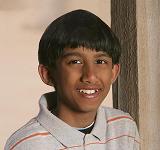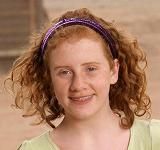In case you haven't caught any of the news stories about it, Kid Nation involves 40 kids (ages 8-15) being let loose in a New Mexico ghost town for 40 days. They have to successfully organize and run the town using late 19th century technology without adult intervention. It is equal parts fascinating social experiment and despicable child exploitation with splashes of "Lord of the Flies" and "Brave New World" thrown in for good measure, and as such makes for an absolute train wreck of a show that is nearly impossible to stop watching once you've started.
It's important to know from the outset that the concept of the children organizing and running the town completely on their own is a farce. The structure of the show imposes itself on them in many ways before they're able to come up with anything organically. That doesn't make it any less of an interesting social experiment, it just means that they likely won't be coming up with many novel solutions to real world problems on the show.
At the very beginning, 36 of the kids are literally dumped out of a school bus and left standing alone in the desert a few miles away from Bonanza City, an artificial reconstruction of a real New Mexico ghost town. In the first blow to the show's "reality", we learn that the other four kids have been appointed as the town council by the producers. Rather than having any sort of election or just seeing who bubbles to the top, these are the people who will be leading the effort.

Mike: an 11-year old Boy Scout from Washington

Taylor: a 10-year old "beauty queen" from Georgia

Anjay: a 12-year old spelling bee champ from Texas

Laurel: a 12-year old student leader from Massachusetts
Aww... just look at those kids. (exploitation, exploitation, exploitation)
Their first task is to haul six wagons full of goods (complete with chickens and goats) down the muddy track to town, and let me tell you... nothing beats watching kids haul heavy things miles across the desert. Dissension sets in immediately as one of the leaders, Mike, doesn't do a lot of the physical work on the trip. He spends a lot of his time waving his arms and yelling instead. One kid in particular, a tall 15-year old named Greg, takes considerable offense to this, and starts a petty rivalry the likes of which any viewer should recognize from their middle school days. We can only hope that he'll smash Mike's glasses with a shout of "Sucks to your ass-mar!" at some point in the near future.
Once they reach town, we begin to see the lack of usable skills that American kids have in today's world. Despite the fact that they "find" a cookbook in the mess hall, none of them are able to do much with it. Their attempt to make macaroni and cheese is laughable. We hear kids utter "that looks like it's boiling" as the camera shows a completely still pot of water, and we watch them fill the pot at least 2/3 full with pasta. I guess Home Ec really isn't a mandatory class anymore when kids can just feed themselves with microwavable meals.
The next morning, when not everyone gets their allotted ration of one pancake for breakfast, the council realizes that without organization they'll be in trouble so they throw an impromptu town meeting to try to sort things out. Unfortunately, the meeting quickly gets out of hand due to said lack of organization. Kids yell at each other, tempers flare, and Mike and the aforementioned Greg nearly have a scuffle before Greg and his toady decide to walk out. Just as everything is about to break down completely, 14-year old Michael saves the day with an impressive speech about cooperation and working together to achieve their goals.
I've read commentary in various places that call the show fake because of speeches like this, "Nobody would ever talk that way", "Kids don't act that way", etc. I think people are overlooking two important things. One, some kids are more well-spoken than you think, and for every impressive speaker they've shown there's been an equally inane kid. Two, these aren't kids in a school yard. They know they're on national TV, and that's bound to create subtle pressures to do the right thing more often than not.
At this point, everything begins to go all "Survivor" for awhile. The leaders read a book in the town chapel that encourages them to split the kids into four different districts: Blue (Anjay), Red (Mike), Green (Laurel), and Yellow (Taylor). As soon as Meaghan finishes telling me about how breeding competition between kids that should instead be working together creates a dangerous social environment, the proof is in the pudding. Chants are started to pump up one district at the expense of others while Greg and his toady (both now in the Blue district) scrawl "Go Blue!" on every surface in town with chalk that they've found. You know that when a 9-year old is calling your behavior juvenile, you're probably not doing the right thing.
The show continues to impose its organization upon the kids, as the next day they compete in an inane challenge to see which district is assigned to what job and how much pay they receive each day. Despite its artificiality, it proves to be an interesting idea. Demonstrating that it's usually luck that determines what socioeconomic class a person ends up in and that the hardest workers don't always get the biggest reward are both important life lessons for these kids to learn.
The Green district gets last place, making them the Laborer class earning 10 cents a day for hauling water and cleaning the lone latrine. Yellow comes in third, so they become the Cooks earning 25 cents a day for preparing all of the town's meals. Blue stumbles down the stretch to finish second, earning them jobs as Merchants making 50 cents a day for running the town's general store and saloon. Mike leads the Red district to the win, meaning that they become the Upper Class getting $1.00 a day for doing whatever they want (helpful or not). The consequences of this social stratification hasn't really been explored yet, but hopefully issues of fairness and social conscience will arise in the future. I know if I were in the Upper Class I would spend all day in the saloon guzzling root beer and playing cards.
The saving grace of the competition portion is that if all of the districts complete the challenge within the allotted time, the entire town will earn a special reward. It was refreshing to see the concept of the whole town banding together to survive not be completely discarded in favor of a more traditional reality show approach. The Green team finished the task with 14 seconds to spare amidst cheers and encouragement, giving the town the choice between seven additional outhouses or a television set. In a shining moment of lucidity, the town council chooses what they need, not what they want, and goes with the additional outhouses.
It doesn't last, though, as none of the kids show any amount of fiscal responsibility with their daily wage. The ones with money blow it quickly on frivolities like candy and pop, and the ones without don't really have enough to buy much. Just when you think someone is going to show some discipline and save over the course of the experience to buy an expensive item, they end up somehow getting the money out of all of the other kids. Sophia, a hard-working Laborer, wants to buy a $3.00 bike so she tries to make money by busking in the street. In no time flat, she's able to get the $2.90 she needs by dancing (badly, I might add) in the main crossroads. You could either view it as an overwhelming act of charity or a horrible misuse of funds, but somehow Sophia was able to get over 15% of the town's money in that single day. It just goes to show you that if charitable organizations had worthy goals (like getting a bike) people would be more willing to give to them.
The show ends with an official town meeting. During these, kids get the option of leaving the show to go home if they think it's too hard for them. Did I mention that there are a lot of crying kids throughout? Homesickness and loneliness make for some horrible television (exploitation, exploitation, exploitation). In the end only 8-year old Jimmy, the youngest kid in the show, goes home because he misses his parents too much.
The leaders also get to hand out a gold star to the hardest worker (as decided by them) at each town meeting. The stars are made from real gold and are worth $20,000 each. The first one is awarded to the street dancing Sophia for her hard work and ingenuity. It's a shame that the creators of the show felt the need to introduce a reward system like that to encourage good participation, but you could see the attitudes of everyone in the room change noticeably once the stars were unveiled.

Poor Jimmy

Dancing Sophia
Despite my better instincts, I'll probably tune in again next week to see if it fulfills any of its sociological promise or if it simply devolves into a sensationalistic nightmare. I don't know what new wrinkles will be thrown the kids' way now that the basic structure of the show has been established, but there's only one way to find out. If you want to check it out yourself, you can watch the first episode on the CBS website. Otherwise, you can tune in on Wednesday nights at 8:00/7:00 Central.

1 comment:
Don't you think Sophia seems much older than everyone else in town? We saw the last 15 minutes so I missed her dancing but she sounds like she's 18. Little Miss Beauty Queen is going to be a manipulator and reminds me of some real pieces of work from my grade school.
Till next time I watch...
Post a Comment